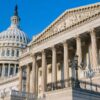
Politics
Oral Arguments Heard in Lawsuit Against Jeff Sessions’s Pot Prohibition
A federal case seeks to deschedule cannabis, but government lawyers are confident that the court will rule once again that if citizens want marijuana legalization, they’ll have to move through Congress.
On Wednesday, attorneys presented their oral arguments in a lawsuit brought against embattled Attorney General Jeff Sessions and his prohibitionist Department of Justice.
In the case, Washington v. Sessions, a collection of plaintiffs is challenging the constitutionality of the Controlled Substances Act. Those plaintiffs include 12-year-old Alexis Bortell whose family moved from Texas to Colorado to treat her epilepsy with medical cannabis. Another plaintiff on the case is Marvin Washington, the former Super Bowl champion who has spent a lot of time advocating for medical marijuana in the NFL in recent years.
At the end of today’s oral arguments, which were presented in a Manhattan courthouse, the presiding judge on the case did not rule on a conclusion. A spokesperson for Judge Alvin Hellerstein, who is presiding over the case in the Southern District of New York, confirmed to Cannabis Business Times that no decision was reached today. The spokesperson wasn’t able to provide much clarity on whether the ruling might happen in the next few days or not either.
Michael S. Hiller, an attorney for the plaintiffs, said in a statement after the oral arguments were heard today that his plaintiffs intended to see the case through to its conclusion, which suggests they are planning to appeal if the judge rules in favor of Jeff Sessions and the Department of Justice.
“We firmly believe the federal government is prostituting and perverting the Controlled Substances Act as well as blatantly criminalizing behavior that they themselves are inducing,” said Hiller. “We look forward to standing on the right side of history and ensuring that cannabis is descheduled once and for all as well as to receiving Judge Hellerstein’s decision, and moving the case forward.”
The Cannabis Cultural Association, a nonprofit based out of New York helping marginalized and underrepresented communities engage in the legal cannabis industry, is also a co-plaintiff in the case. The association is using their role in the case to emphasize criminal justice reform, access to medical cannabis and adult use legalization across the board.
“We look forward to receiving the judge’s decision and moving the case forward. This is not just about cannabis, this is a human rights issue,” CCA Co-founder and Deputy Director Jake Plowden told Cannabis Now following today’s oral arguments. “Moving this case forward could mean the descheduling of cannabis and ultimately ending global cannabis prohibition starting in its birthplace: America.”
The case has gained national attention since it was initially filed last July, especially since Sessions moved in early January to revoke the Cole Memo’s policy of leaving state-compliant cannabis businesses alone under specific circumstances.
According to the New York Times, the plaintiff’s 98-page complaint filing includes arguments that are all-encompassing. ”The suit presents its case for legalization not only through a host of constitutional arguments, but also by way of a world-historical tour of marijuana use — from its first purported role 10,000 years ago in the production of Taiwanese pottery to the smoking habits of President Barack Obama in his younger days,” the Times reported.
The trip through pot history also made stops in Egypt, Thomas Jefferson’s Monticello plantation, and even an appearance by Roger Stone, the infamous Trump advisor who supports cannabis legalization.
In the past, courts have always tossed these kinds of attempts to question the legality of America’s drug scheduling process. But this time, it’s different — at least in the eyes of the plaintiff’s attorney Joseph A. Bundy.
“It’s the first time a young child who needs life-saving medicine has stood up to the government to be able to use it,” Bondy told the Times. “It’s the first time that a group of young millennials of color has stood up to the government and said the marijuana law is wrong and has destroyed their communities.”
The government, of course, appears to believe that the lawsuit has no legs. The government’s attorneys have argued that if the plaintiffs want to deschedule cannabis, they need to get Congress to pass a new law.
In the end, the government’s lawyers told the Times that to the reality of this case is that it’s just “the latest in a long list of cases asserting constitutional challenges to marijuana regulation under the CSA. Those challenges have been uniformly rejected by the federal courts.”
TELL US, do you think this lawsuit could lead to the descheduling of cannabis?


























